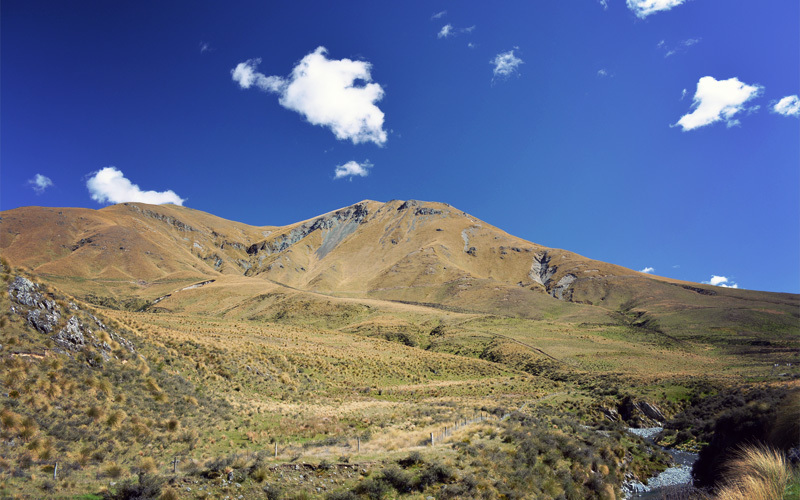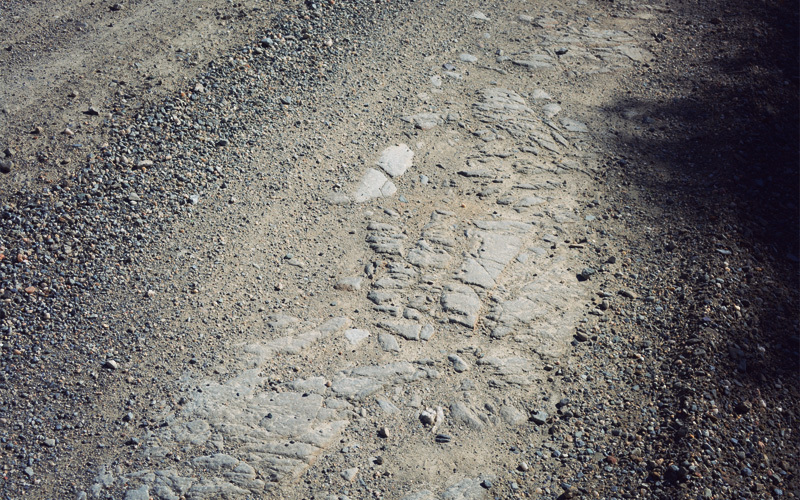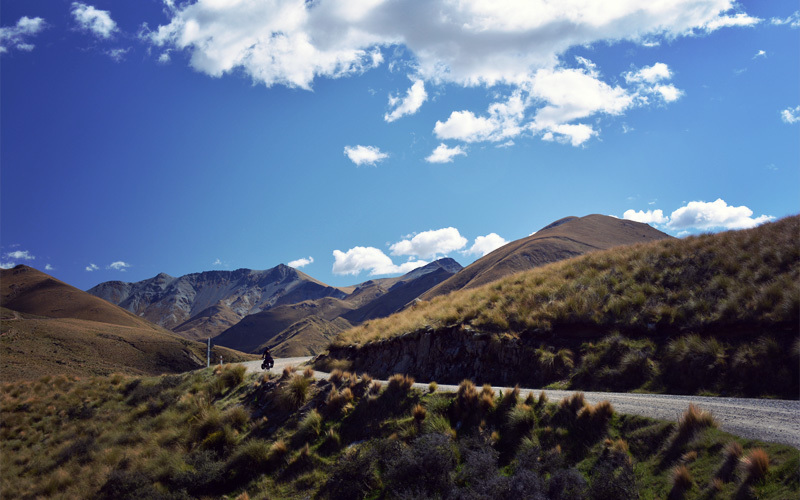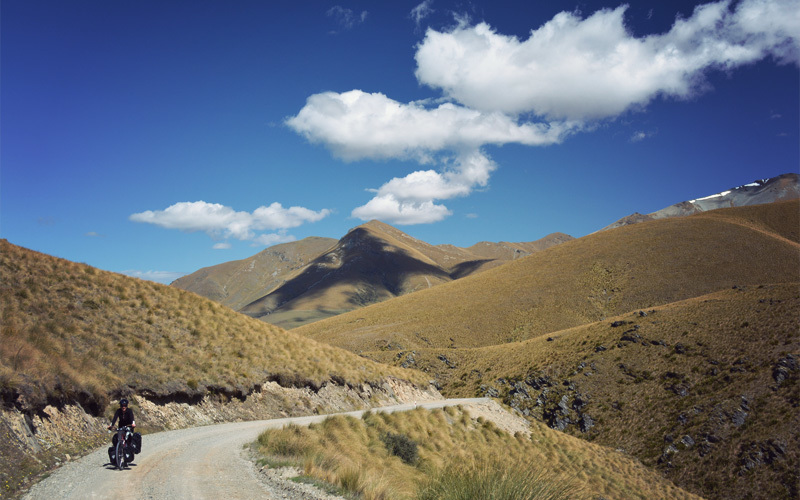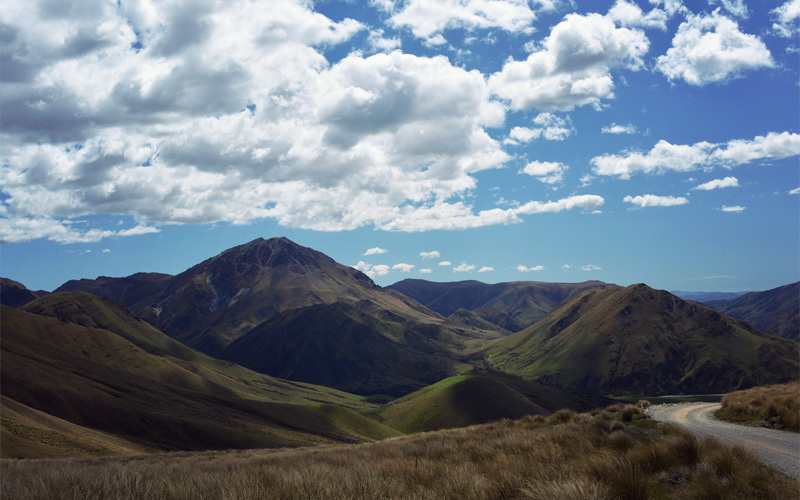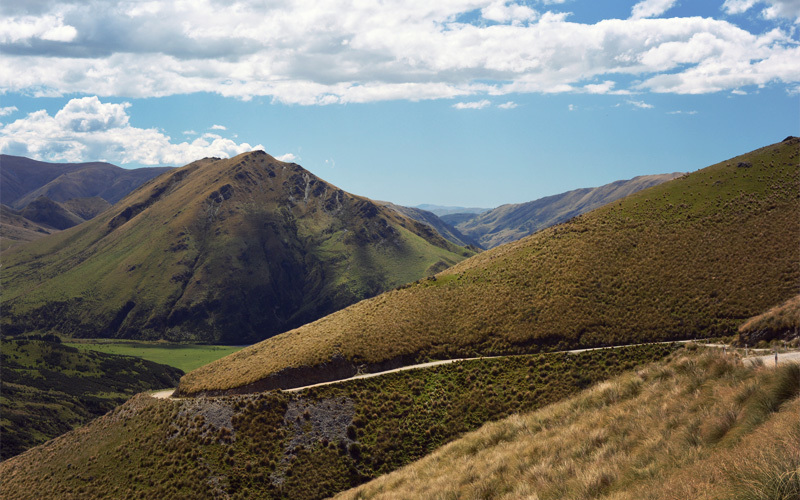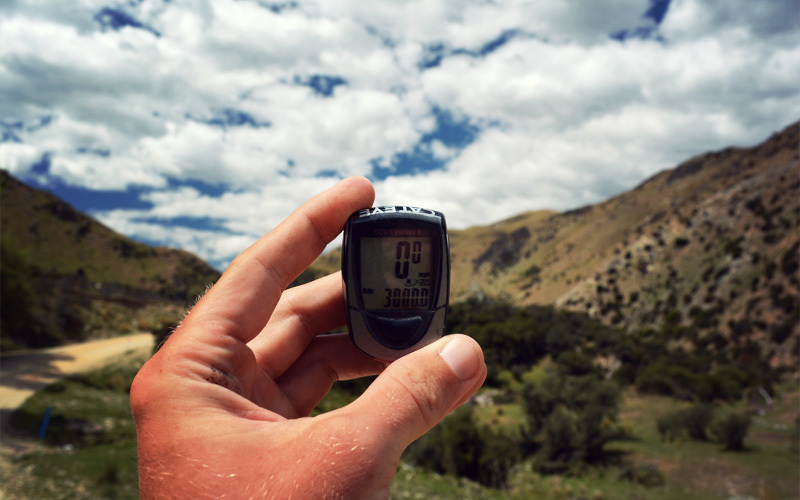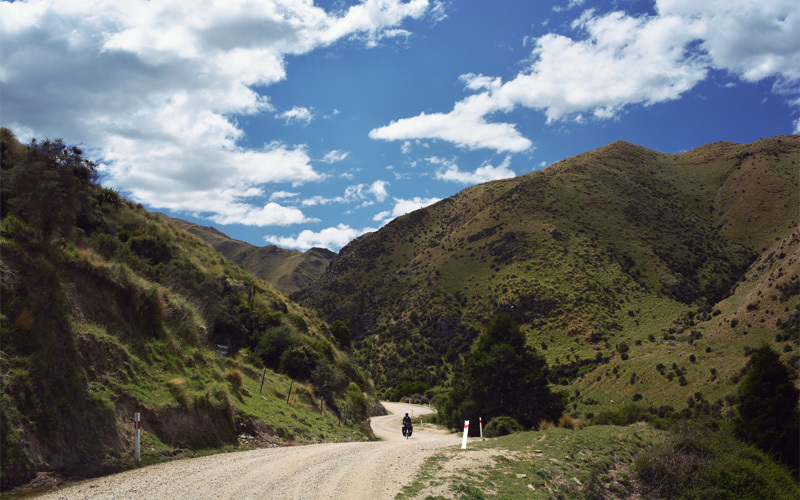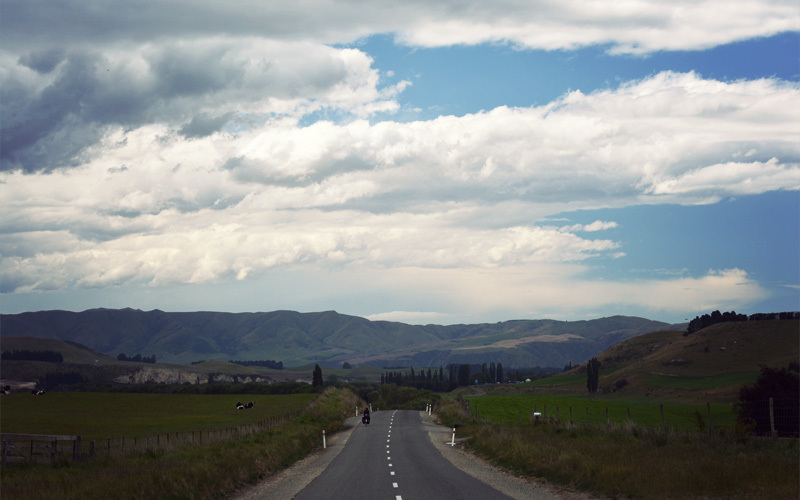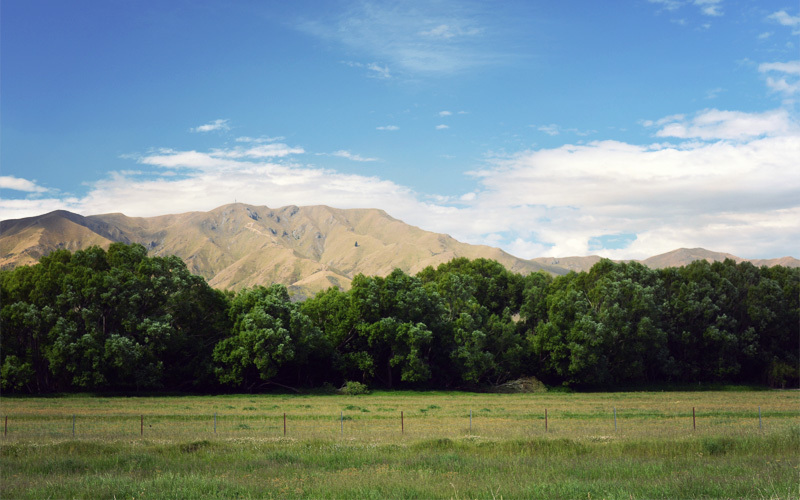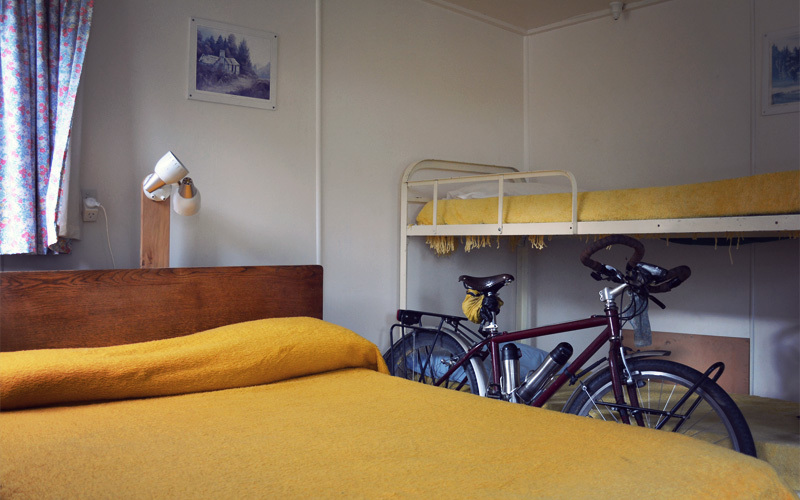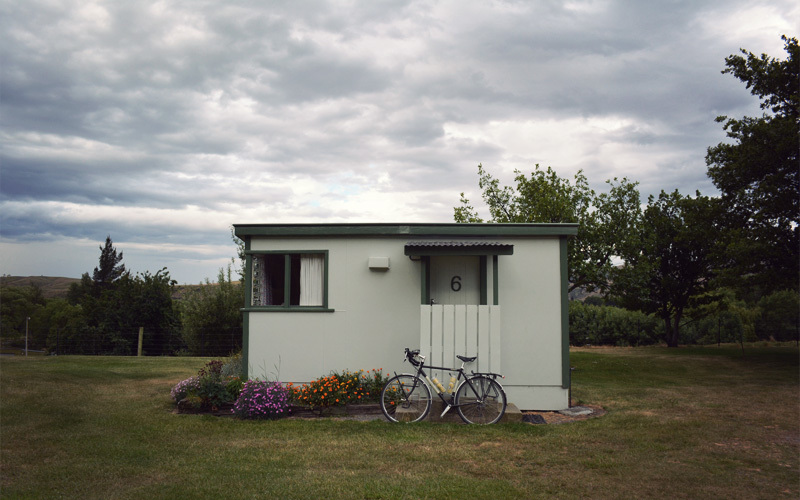November 24, 2014
Day 90: Danseys Pass Recreation Reserve to Kurow, NZ
The clouds exhaust themselves in the night and we return to the road under skies of clear, deep blue, and with the air so warm that I ride in a t-shirt from the end of the first mile onward. Right away we see a series of signs advising drivers that the road ahead is closed to RVs, to buses, to anything with a trailer, and any vehicle that doesn't have four-wheel drive.
"Pain is inevitable," Kristen says to me as we start to head up, "But misery is optional!"

| Heart | 1 | Comment | 0 | Link |
We ride over sections of road that were blasted out of schist and into existence, where the marks of pickaxes are still visible in both the road surface and the walls of rock that go straight up on our right. No matter which direction we look we can't see any fences, just layer after layer of hills, all of them thick with clumps of yellow tussock grass.
The grade starts subtle at first, but soon the vertical gap between the road and the river off to our left grows, and sweat starts to pour off my forehead and bead up on my arms. Tiny dust devils swirl across the road and kick up short and pale dirt clouds, and we rumble across the occasional cattle guard, which the Kiwis call a cattle stop. When we pause to rest, a gentle breeze blows up from below to cool us down. Although it's more clear today than yesterday which path will lead us through this mountain range, the height and depth of the folds and curves of the hills mean that we still don't know the precise route until we round a corner and the next quarter-mile lays itself out in front of us.
"I so love this," Kristen says to me as we crank up at four miles per hour.
"Why?"
"It's so adventurous. There's no one here, it's a gravel road, it's just quiet, and you can hear the insects and the wind. And it's like you said, you don't know where you're going, you just see the folds of the hills. You look back along the the ridge and you see where you started, but when you started you couldn't conceive of the depth of it or anything. And now you're just in it. It makes me feel more human; the farther away from civilization we go, the more alive I feel. I think if you weren't here it would seem so overwhelming. Out here you just feel so tiny and minuscule in the scope of the world."
A guy on a motorcycle headed down the pass tells us that we're almost to the top, which is how we know that we are in fact not almost to the top, because every bit of elevation advice given from someone in a vehicle will always be incorrect. If bicycle touring has a set of laws, this is one of them. And so it goes today, where "you're almost to the top" translates to, "you have forty-five more minutes of sweating and hard cranking on soft gravel and also a false summit to the top." By the time we get there, drops of sweat fall off the tip of my chin and down onto the dirt next to my right shoe, and the front of my shirt is a patchwork of dark green wet spots.
At the top we look down a canyon and catch our first view of the Pacific Ocean — hazy and distant, but a view all the same — since we crossed from Wellington to Picton almost five weeks ago. We celebrate with chunks of chocolate and terrible dancing in between congratulating ourselves on a job well done and making fun of the dudes from the campground last night.
The first part of the descent perches us on the edge of chaos, as the bikes wander through narrow paths in the gravel and pound over long stretches of washboard. At the same time, we try not to shoot off the edge of the ridge, we keep an eye out for sheep because this is still New Zealand, and we wish that the death grips we place on the brakes would actually do the job of slowing us down — but with stretched cables and rim brakes and cantilevers I know this is a lot to ask. We stop every few tenths of a mile to let the rims cool, avoid a tire blowout, and keep our hands from cramping up. Beyond the ever-present threat of injury, the views are among the most wonderful we've experienced so far, with the hills and mountains showing deep shades of green and remarkable depth and texture all the way from their bases to their tops. To be here, on this beautiful day, in this stunning place, makes up for all of the frustration and frozen fingers it took to make it this far.
Farther on we get a thumbs up from a farmer driving an ATV who passes going the other direction. He pulls a trailer filled with half a dozen herding dogs, who are all hanging tongues and excited eyes and wagging tails. They each have this look on their face that says, "Hey! You! We're gonna go spend the afternoon chasing sheep all up and down the hillsides! It's gonna be great! This is the best day ever!"
Whenever we lose the river, we lose the downhill, and it takes a lot of tough, slow, focused grinding to make it over the hills we have to travel to get the downhill back. It all makes for a long stretch of riding. In the first five hours of the day we cover only twenty miles, and by the time we reach the highway at Duntroon in the later afternoon we're tired and hungry but almost out of both food and water. Kristen also fights against a worsening bladder infection, which is one of the worst health problems to try and sort out while cycling. But Duntroon is only a tiny collection of buildings along a small rural highway, so with no food or water to be had there's nothing to do but keep going.
A tailwind helps push us up the valley toward the north. Poorly calibrated sprinklers shoot us with water as we ride along the edge of the shoulder, and soon we start to see vineyard and wineries in addition to the cattle farms. When my chain falls off while switching from the middle chain ring to the small, I put it back on by using one index finger to take up the pressure on the rear derailleur, and the other to lift the chain back up and on to the ring. With no grass to wipe the grease and grit off on, and too much grease and grit to just smear on my leg, I stick the finger in my mouth, lick off as much as I can, and spit a thick blob of black and white into the shoulder gravel. Throughout the fifteen-mile sprint to Kurow the air fills with the indescribable smell that comes from equal parts wildflowers and cow shit.
By the time we reach Kurow we're both fried. After settling into a tiny cabin where the interior hasn't been updated in any way since the winter of 1972, we go to work doing what each of feels we need to in order to build ourselves back up. Kristen heads off to take a shower, fixes a large bowl of oats and yogurt, throws a load of laundry in the washer, and starts down the unenviable path of chugging cranberry juice by the gallon. I bike back into town to buy chicken strips and onion rings and cider, which I proceed to power through in about four minutes while checking football scores. Then, to the surprise of no one but me, I collapse on the bed with a horrible stomach ache.
Later I take a long, hot shower. Halfway through it an eighty-year-old Frenchman dressed in khaki pants and a matching khaki shirt walks up to the dishwashing area located on the other side of the shower wall. For the next five minutes I hear him sing quietly to himself in French over the muffling hiss of the dueling water faucets. And in that moment, all thoughts of the day's fatigue and hunger and dehydration fall away, because I'm reminded in a charming but clear way of an important fact, maybe the most important fact: I'm not at home, in the middle of a life where this Monday would have blended in with all of the Mondays that came before and all of the Mondays that came after. This moment with the singing Frenchman, as insignificant and fleeting as it is, would never happen in the Hawthorne neighborhood of Portland, nor anywhere in Portland, nor I imagine anywhere else in Oregon. But it happened here, on the other side of the world in New Zealand, where it's a small but meaningful part of a Monday that both Kristen and I will remember forever. It's easy to lose track of that perspective as this trip goes from covering days and weeks to months and eventually years, but it's always true. No matter how hungry or tired or sick we might feel along the way, every day out here is unique and unpredictable in so many different ways, and that makes all of them worth appreciating.
The wind picks up strength as the evening turns to night, and soon the force of it starts to shake the walls of the cabin. Inside we piece together a plan for where we're headed tomorrow and think up possible destinations for the days to follow. When the cold that sneaks in through the gaps in the door frame starts to turn our toes cold, we crawl into the sleeping bag and turn out the lights.
Today's ride: 46 miles (74 km)
Total: 3,034 miles (4,883 km)
| Rate this entry's writing | Heart | 2 |
| Comment on this entry | Comment | 0 |
